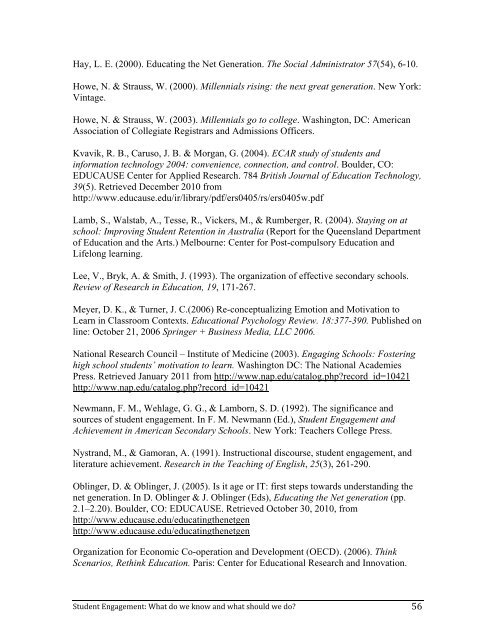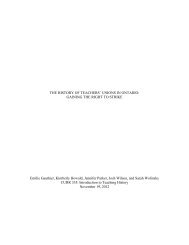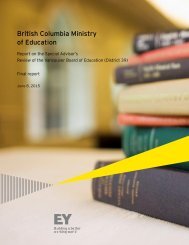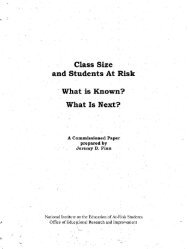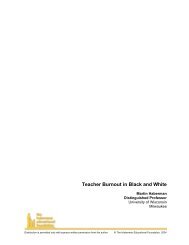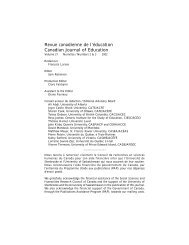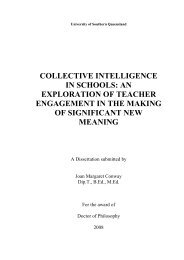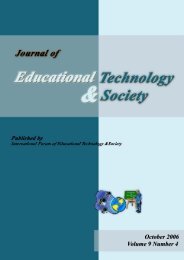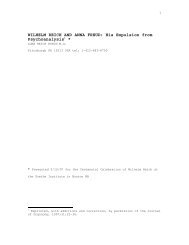Student Engagement: What do we know and what should we do?
Student Engagement: What do we know and what should we do?
Student Engagement: What do we know and what should we do?
Create successful ePaper yourself
Turn your PDF publications into a flip-book with our unique Google optimized e-Paper software.
Hay, L. E. (2000). Educating the Net Generation. The Social Administrator 57(54), 6-10.<br />
Ho<strong>we</strong>, N. & Strauss, W. (2000). Millennials rising: the next great generation. New York:<br />
Vintage.<br />
Ho<strong>we</strong>, N. & Strauss, W. (2003). Millennials go to college. Washington, DC: American<br />
Association of Collegiate Registrars <strong>and</strong> Admissions Officers.<br />
Kvavik, R. B., Caruso, J. B. & Morgan, G. (2004). ECAR study of students <strong>and</strong><br />
information technology 2004: convenience, connection, <strong>and</strong> control. Boulder, CO:<br />
EDUCAUSE Center for Applied Research. 784 British Journal of Education Technology,<br />
39(5). Retrieved December 2010 from<br />
http://www.educause.edu/ir/library/pdf/ers0405/rs/ers0405w.pdf<br />
Lamb, S., Walstab, A., Tesse, R., Vickers, M., & Rumberger, R. (2004). Staying on at<br />
school: Improving <strong>Student</strong> Retention in Australia (Report for the Queensl<strong>and</strong> Department<br />
of Education <strong>and</strong> the Arts.) Melbourne: Center for Post-compulsory Education <strong>and</strong><br />
Lifelong learning.<br />
Lee, V., Bryk, A. & Smith, J. (1993). The organization of effective secondary schools.<br />
Review of Research in Education, 19, 171-267.<br />
Meyer, D. K., & Turner, J. C.(2006) Re-conceptualizing Emotion <strong>and</strong> Motivation to<br />
Learn in Classroom Contexts. Educational Psychology Review. 18:377-390. Published on<br />
line: October 21, 2006 Springer + Business Media, LLC 2006.<br />
National Research Council – Institute of Medicine (2003). Engaging Schools: Fostering<br />
high school students’ motivation to learn. Washington DC: The National Academies<br />
Press. Retrieved January 2011 from http://www.nap.edu/catalog.php?record_id=10421<br />
http://www.nap.edu/catalog.php?record_id=10421<br />
Newmann, F. M., Wehlage, G. G., & Lamborn, S. D. (1992). The significance <strong>and</strong><br />
sources of student engagement. In F. M. Newmann (Ed.), <strong>Student</strong> <strong>Engagement</strong> <strong>and</strong><br />
Achievement in American Secondary Schools. New York: Teachers College Press.<br />
Nystr<strong>and</strong>, M., & Gamoran, A. (1991). Instructional discourse, student engagement, <strong>and</strong><br />
literature achievement. Research in the Teaching of English, 25(3), 261-290.<br />
Oblinger, D. & Oblinger, J. (2005). Is it age or IT: first steps towards underst<strong>and</strong>ing the<br />
net generation. In D. Oblinger & J. Oblinger (Eds), Educating the Net generation (pp.<br />
2.1–2.20). Boulder, CO: EDUCAUSE. Retrieved October 30, 2010, from<br />
http://www.educause.edu/educatingthenetgen<br />
http://www.educause.edu/educatingthenetgen<br />
Organization for Economic Co-operation <strong>and</strong> Development (OECD). (2006). Think<br />
Scenarios, Rethink Education. Paris: Center for Educational Research <strong>and</strong> Innovation.<br />
<strong>Student</strong> <strong>Engagement</strong>: <strong>What</strong> <strong>do</strong> <strong>we</strong> <strong>know</strong> <strong>and</strong> <strong>what</strong> <strong>should</strong> <strong>we</strong> <strong>do</strong>? 56


